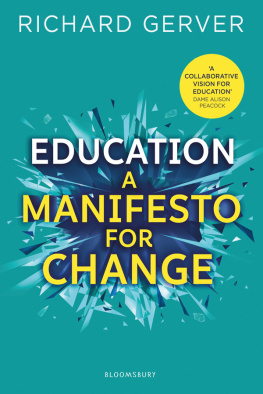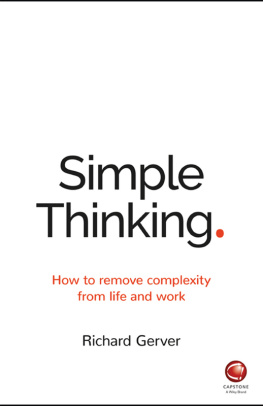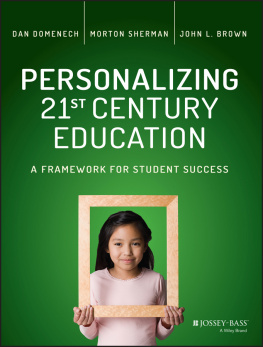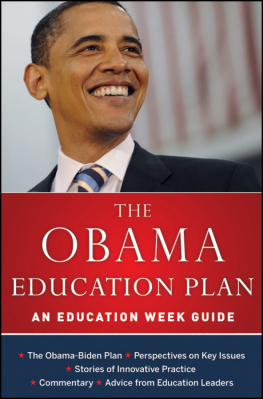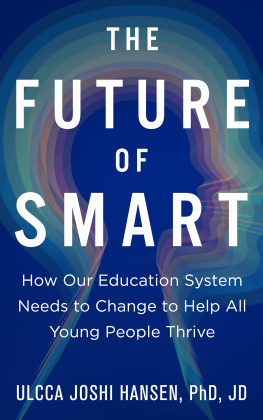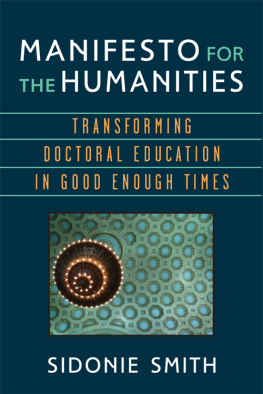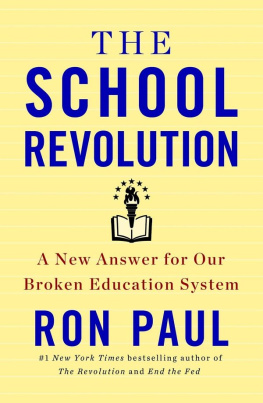
Praise for
Education: A Manifesto for Change
Richard Gervers book gives a personal yet authoritative account of the current state of UK education, and also provides a refreshingly optimistic perspective on where we might go next.
Geoff Barton, General Secretary, Association of School and College Leaders, @RealGeoffBarton
Richard Gerver not only writes about optimism, he exemplifies it and we desperately need that now. It is an optimism founded in his wide and unique experience and definitely worth sharing. Read this book!
David Cameron, Education Consultant, @realdcameron
In this refreshing, honest and deeply personal book, Richard Gerver builds on all his international experience to set out a manifesto for change in education, with collaboration, openness and optimism at its core.
Steve Munby, Visiting Professor at UCL London Institute of Education, @steve_munby
In this powerful book, Gerver calls for a collaborative vision for education that will prepare society to thrive in uncertainty. He shares sharp insight, achieved through school leadership, uniquely combined with global experience of working with eminent leaders throughout industry. A great read.
Dame Alison Peacock, Chief Executive, Chartered College of Teaching, @AlisonMPeacock
Intelligent, passionate, honest and at times contentious, Richard Gerver does not simply present a manifesto for education. He gives us joined-up thinking about how education, business and society can work and succeed together.
Steve Wheeler, Author and Speaker, @SteveWheeler

BLOOMSBURY EDUCATION
Bloomsbury Publishing Plc
50 Bedford Square, London, WC1B 3DP, UK
BLOOMSBURY, BLOOMSBURY EDUCATION and the Diana logo are trademarks of Bloomsbury Publishing Plc
First published in Great Britain 2019
This electronic edition published 2019
Text copyright Richard Gerver, 2019
Richard Gerver has asserted his right under the Copyright, Designs and Patents Act, 1988, to be identified as Author of this work
Bloomsbury Publishing Plc does not have any control over, or responsibility for, any third-party websites referred to or in this book. All internet addresses given in this book were correct at the time of going to press. The author and publisher regret any inconvenience caused if addresses have changed or sites have ceased to exist, but can accept no responsibility for any such changes
All rights reserved. No part of this publication may be reproduced or transmitted in any form or by any means, electronic or mechanical, including photocopying, recording, or any information storage or retrieval system, without prior permission in writing from the publishers
A catalogue record for this book is available from the British Library
ISBN: PB: 978-1-4729-6236-2; ePDF: 978-1-4729-6237-9; ePub: 978-1-4729-6238-6
To find out more about our authors and books visit www.bloomsbury.com and sign up for our newsletters
Other titles from Bloomsbury Education
Creating Tomorrows Schools Today by Richard Gerver
Ten Traits of Resilience: Achieving positivity and purpose in school leadership by James Hilton
Leading from the Edge: A school leaders guide to recognising and overcoming stress by James Hilton
Narrowing the Attainment Gap: A handbook for schools by Daniel Sobel
Leading on Pastoral Care by Daniel Sobel
Achievement for All: Raising aspirations, access and achievement by Sonia Blandford and Catherine Knowles
To Stamps
You gave me so many of the tools for my future
RIP x
Contents
I started my journey as an adult, prepared for the challenges of my future thanks to my family and certain teachers of my own; I name you in this book.
My career as a teacher is down to my amazing wife Lynne and my training at the University of Derby.
The best years of my professional life and of my own learning were spent in the three schools in which I was privileged enough to work: Chaddesden Park Junior, St Johns CE Primary and, of course, Grange; to all of the staff, pupils and wider communities who welcomed me, nurtured me and ultimately trusted me, thank you all!
To the guiding lights who have influenced, encouraged and constructively criticised my thoughts, actions and words as an educator: Sir Ken Robinson, James Hilton, Pam Earlam, Les Seymour, et al. I hope that I am a part of your legacies.
To Hannah Marston and the team at Bloomsbury, thank you so much for letting me share my passion one more time.
Finally, to all of you who commit your energy, passion, professionalism and purpose to working with our children every single day, in order to help them to live fulfilling and meaningful lives words are not enough but because of you, the world could be so bright!
Richard Gerver has over 25 years experience of working in schools and more recently education settings across the world. He is someone we should listen to and, as an educator, he has continued to inspire me over the past five years, ever since I first read his work and invited him in to present a keynote at one of my schools.
There reaches a point in every teachers career when they have to walk away from a job they love. This has been a decision that both Richard and I have taken in the past decade and, as Richard describes, it is one of those lump-in-throat moments.
In this heartwarming book, Richard reminds the reader of the footprints teachers and school leaders have every day: they make thousands and thousands of idiosyncratic decisions in the classroom, which, at a whole-school level, make a collective difference to the lives of children. Those working in our schools will be familiar with political rhetoric versus our legacy; the reality that our internal decisions have little or no value for metrics and accountability, but define a teachers impact on developing a childs love of learning. This sociological data, which is hard to quantify, is given no value when it comes to school improvement.
A key sentence in Richards introduction is this line from a colleague listening to him speak at an event: I never thought Id get the chance to hear you speak, as Id been told that you were no longer involved in education. Here Richard explains why he has retreated from the front-line educational debate, unpicking the truth behind the challenges of working for oneself, as well as explaining why his perspective on education has changed. As I find myself also sitting on the other side of the fence, I can understand why this perspective is offered, but stepping into a world that Richard has now embraced for ten years, I believe I have never been more immersed in education at a whole-system level than I am now. Although physically I may not be attached to one school, like Richard, I find myself working in schools every week or speaking with fellow educators on a daily basis all across the world. This perspective has given Richard a wider lens to remind us, and share his insights about, why we need change from the ground up.
Richard discusses what he has learnt from his travels about assessment, curriculum and socio-economic issues, highlighting what, why and how other countries are moving towards more efficient systems, with less focus on testing, and towards new models that can better develop young people as well as educational institutions. As Richard articulates with passion and simplicity, our education model is reactive rather than proactive and in the final chapter of the book, he shares a fascinating alternative to lessen academic burdens.
Next page
